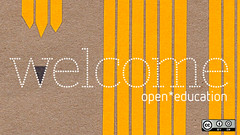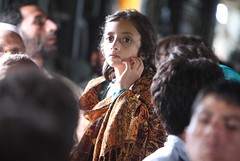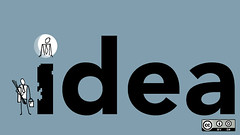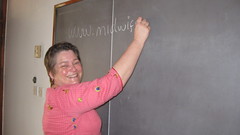When I moved from the UK to New Zealand in 1996, I felt disconnected to the world, both professionally and personally. I was working as a midwife in Gisborne which is an isolated rural community on the east coast of the north island of New Zealand. I felt isolated professionally because I had minimal access to research resources, colleagues and professional development opportunities. I could not afford to subscribe journals and or go to conferences. At the same time, I started to think about how I could openly share my ideas with midwives and support them to improve their practice. I became frustrated because I wanted to publish the journal articles I had written on the Internet for midwives to access, but couldn't because of copyright.
In the early years of the new century I paid a web designer to host a website for me which I used to share the findings of my Masters research. But the problem with that was it cost a huge amount of money and I had no day-to-day control over what was published. In 2007 I was introduced to social media and the concept of OER and open education by Leigh Blackall. By that stage, I was a midwifery educator and researcher. Social media including blogs, wiki, YouTube and Slideshare gives me total control over my material allowing me to publish it whenever and however I please. But the problem I came up against was copyright. I am very happy for people to be able to access my work and use it for their own purposes, but I still want them to attribute the work back to me. So I was very pleased when Leigh pointed me toward Creative Commons which is a licensing framework which allows me to share my material but retain control over how it is used.

The other piece of the puzzle is working for an organisation that encourages OER and open education. Otago Polytechnic has a default Creative Commons intellectual policy. This allows me to retain ownership of the material I generate as a member of staff. I have also been given the opportunity by Otago Polytechnic to explore how courses can be facilitated in the open online environment using platforms such as Wikieducator which has led to my involvement with the course "Facilitating Online" which was originally developed by Leigh Blackall and Bronwyn Hegarty. I was a student of the course in 2007 and now facilitate it as a lecturer.
What has OER and open education done for me?
It allows me to get my material out to a much wider audience than would otherwise happen if I just kept to publishing in traditional academic journals. It allows me to interact people to get feedback on my work, exchange ideas and further refine my thoughts. It allows me to contribute knowledge and resources to the wider community which meets my philosophy of social justice. At the same time, it has allowed me to build a reputation and identity which opens the door to collaborative and research opportunities that would otherwise be closed.
The beauty of OER isn't just around what I can contribute in terms of knowledge generation, but how I can re-use the work of other people. The classic example is the images and photos that are published on Flickr under a CC licence. Having access to thousands of photos has allowed me to completely change the way I give presentations, focusing on images to present an idea as opposed to text.

Teaching and learning in an open environment is challenging. I feel very vulnerable at times when I publish my materials, fearing that my work will be criticised and my academic reputation will be tarnished as a result. I have had to learn how to take critical feedback which inevitably comes when you take the open approach to teaching and learning. At the same time this feedback has helped me to become a much more open teacher and person; to become a learner-centred teacher and be a lot more objective in my own personal reflection, which I think has improved my teaching. I have been given amazing opportunities to collaborate with people because of my work, such as my trip to Pakistan earlier this year. And I have been "forced" into reviewing my philosophy to education, which has led to some hard decisions about where and when I will publish my academic work ie I am following the example of people such as Professor Terry Anderson, and only submit my work to open access journals. This decision alone has huge ramifications for my academic career.

How can you get into OER and open education?
I think the way to get into OER and open education is to take small steps to build your confidence and understanding about the issues involved. Make yourself familiar with the Creative Commons framework so you understand more about the issues of licensing. Have a look at platforms and resources that support OER such as Wikieducator, and open access journals, for example, 'The International Journal of Research in Open and Distance Learning'. 'Talk' to advocates of OER on their blogs such as Leigh Blackall, Terry Anderson and Martin Wellor, and don't be afraid to ask them about their philosophy or the practicalities of OER.

Then give it a go.
Every time you give a presentation, publish your slides on Slideshare. Set up a blog and start to write (or video record) about your thoughts, research, teaching and so on. Start a wiki and publish your teaching resources that can range from a plan for a lecture to a whole course. Record or video your presentations and conversations as mp3 and mp4 files and upload to on BlipTV. Put a Creative Commons licence on all your work so that people can not only access your materials but also re-use them.
For me, OER and open education is about looking at what I can do to support education and the wider community in a sustainable way; how I can share ideas and resources, especially with people who do not have easy access to traditional resources. But OER is more than tangible results, it is also about a philosophy of teaching and learning. It challenges me to be a learner-centred teacher and to be a life-long learner. This is what has changed my life.
Sarah Stewart

Sarah Stewart is an education developer at Otago Polytechnic, Dunedin and about to become a virtual midwifery lecturer at Griffith University, Brisbane in 2011. Sarah is widely known for her open approach to education which includes her blog, her work with ePortfolios and her management and facilitation of the Virtual International Day of the Midwife. Sarah has published widely and consults on international health and education projects, which currently includes collaborative research with midwifery educators in the UK and USA looking at the Second Life Virtual Birthing Unit.







No comments:
Post a Comment